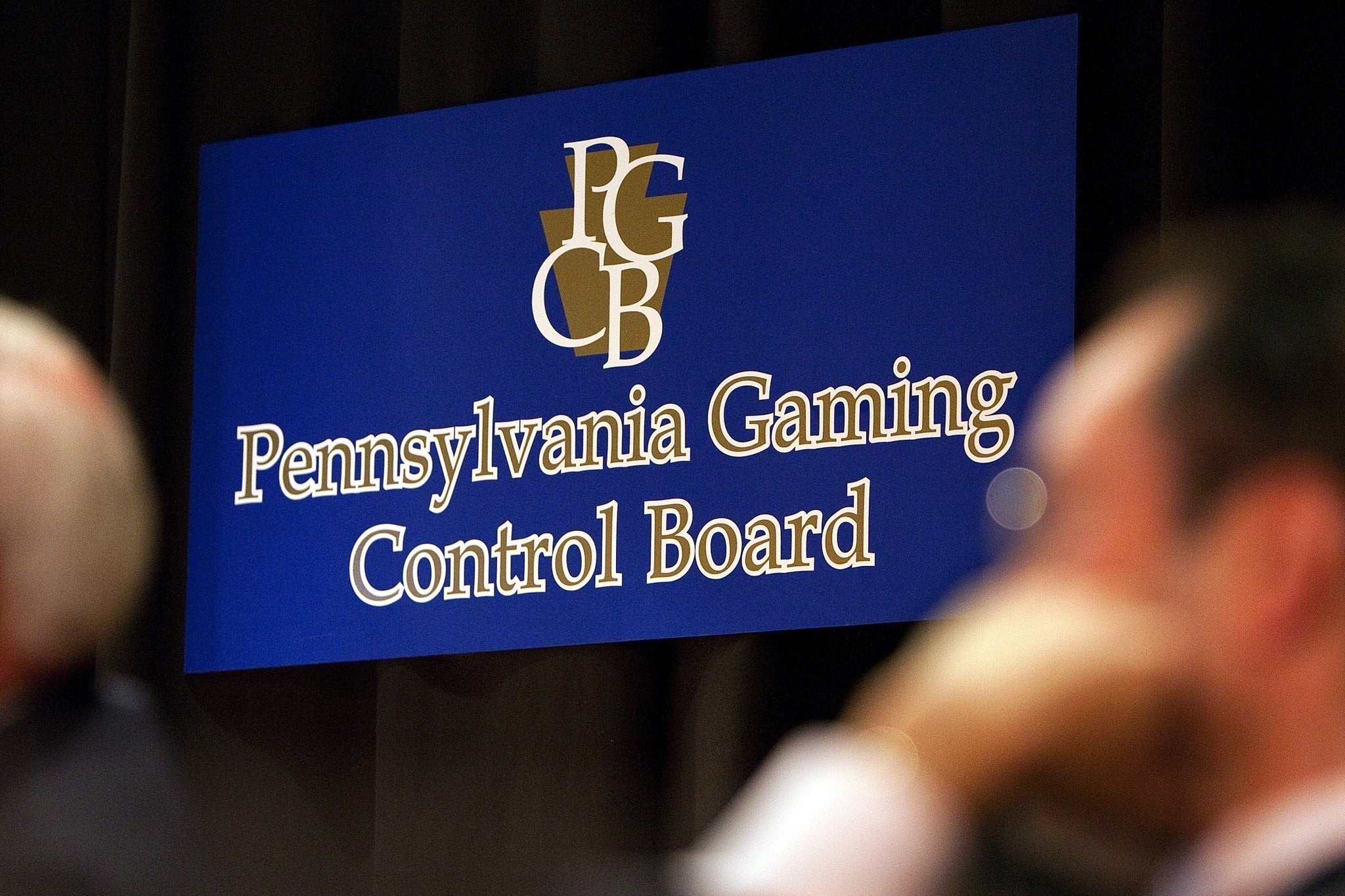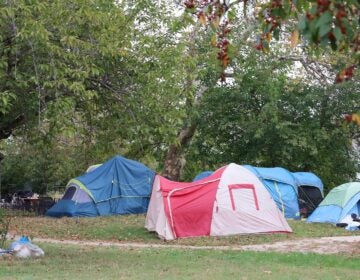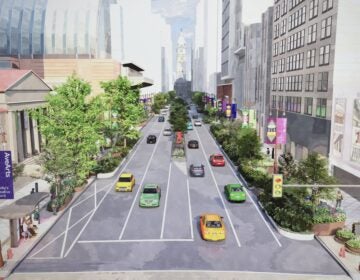Casino applicants take one last shot at persuading the gaming board to pick them

Four of five applicants for Philadelphia’s remaining casino license Wednesday took one last shot at convincing the Pennsylvania Gaming Control Board to pick them.
Intervening party SugarHouse urged the board to pick none of them, including the fifth applicant, Stadium Casino, which proposes the Live! Hotel & Casino, did not present. Read what a team principal told PlanPhilly about the project here.
The second intervening party – Rodeph Shalom Synagogue, the Mathematics, Civics and Sciences Charter School and the Friends Select School – advised the board to pick any applicant but the one proposed for a site near them: Tower Investment’s Provence.
Presentations were limited to 15 minutes for the interveners and the applicants who spoke: PHL Local Gaming, which proposes Casino Revolution at 333 S. Front Street; Market East Associates, which proposes MARKET8 at 8th and Market streets; Tower Investments; and PA Gaming Ventures, proposing Hollywood Casino at 700 Packer Avenue.
The orations were mostly summaries of all the evidence and testimony each applicant and intervener already provided the board, with key points emphasized and some additional comments on what everyone else has said thrown in.
That’s the way it had to be: Participants were not allowed to introduce any new evidence. Care to view the evidence already in the record? Much of it, including revenue projections, hearing transcripts, traffic impact reports and the city’s economic analysis of the applications, can be found here. The applicants, including Live!, also filed additional documents with the board after the suitability hearings. They are attached at the bottom of this article.
On Wednesday, the intervening parties went first.
SugarHouse
Its position remains that opening an additional casino would siphon customers from SugarHouse and other regional casinos already open, put SugarHouse in financial jeopardy, and do more harm than good to the state’s gaming industry over the long-haul.
SugarHouse attorney John Donnelly assured the board it has the legal right to hold the license and not award it to anyone, at least not now. Administrative agencies have discretion to interpret their own statute, he said. Donnelly also pointed out that the second license actually was already issued, to the former Foxwoods Casino team. It’s because they couldn’t open that the current discussion is even taking place, he said. “I see no problem with the board doing what you think is in the best interest of the Commonwealth.”
Donnelly praised SugarHouse’s Neil Bluhm, also a key player in Pittsburgh’s Rivers Casino. He said when the economy tanked, Bluhm put in his personal money to build SugarHouse and Rivers, even when experts were advising him to declare bankruptcy at Rivers, which had stumbled with its original team before Bluhm got involved. Donnelly noted that some accounts have called him a “cry baby” for saying that a second casino would hurt SugarHouse, especially since SugarHouse knew another casino license was coming to the area. SugarHouse was expecting a second casino in Philadelphia, but was not expecting Valley Forge, he said, nor did it count on legal gaming in other adjacent states.
He said SugarHouse isn’t earning what it projected it would earn on its slots as it is, and that “predatory marketing” is already occurring with the existing casinos going after each other’s customers.
The applicants’ estimates on how much money they would raise are all way too high, he said. And their estimates on how much of their revenues would come at the expense of existing casinos are all too low, he said.
The three candidates in South Philadelphia have argued that they would siphon fewer customers from SugarHouse than the center city locations would, Donnelly said, but to SugarHouse, it makes no difference – not when the distance is just miles, and when 30 percent of SugarHouse’s market comes from the stadium area. “They would either be shot by the guys coming after them or jump in the river and die from the fall or drown. It doesn’t matter,” he said.
Rodeph Shalom and the two schools
Attorney Larry Spector said The Provence was the wrong answer because of the traffic and parking problems it would cause and what he described as Tower’s failure to assure the board those problems would, or even could, be fixed.
During the earlier suitability hearings in Philadelphia, PennDOT representative Francis Hanney said that Bart Blatstein, Tower principal, had committed to spending 1 to 2 percent of the total project cost on making traffic improvements. Spector said that commitment came out of nowhere, and was not mentioned in documents filed by Tower since the hearing.
Spector said the problems already along the Vine Street corridor would clearly get worse with a casino added, and “even if we had 1 to 2 percent, money to throw at the problem, what will that do? Will that solve the problem? We have no answer to that.”
He said that like promises made to the board about parking and the prospects for more parking, this was not part of the original proposal, and only came about when the team was pressed for answers. He further said that some of the lots Tower said it could use for parking are actually either going to be used for another development purpose or are restricted use for the patrons of other entities.
(Tower Entertainment’s attorney would later take issue with these points.)
Spector said this was all evidence that called into question Tower’s credibility, as is the team’s identification of eight nearby schools and churches when there are 30.
“It’s really quite a dodge and weave,” he said. “Only when confronted do they start to bounce around.”
Casino Revolution
Representing PHL Local Gaming, attorney John O’Riordan said the Casino Revolution team has the best partners, the best location, the most land to grow on and the best highway access. He said a million people annually pass by the location, and yet it is the furthest from any residential neighborhood. Because it would use a building principal Joe Procacci already owns, it could open a portion of the casino sooner than any other applicant could open its doors, he said.
O’Riordan said with more than 12 percent African American ownership, and a commitment to work with one of the nation’s largest African-American owned construction firms, Revolution has “diversity that no one else has.”
O’Riordan also noted that the closest neighborhood – Whitman – has given “solid” support to the project, and that it lacks the opposition that Tower and Market8 have. (Both Tower and Market8 also claim strong community support, and have signed community benefits agreements.)
O’Riordan suggested the board rule out either center city location for a few key reasons: Either would make current traffic congestion worse. Both rely on convention-goers and tourists for business, and neither group is likely to gamble. Both tout their proximity to public transit, but “People with a pocket full of money are not going to take public transit.” Either would cannibalize SugarHouse more than a South Philadelphia location.
He said Casino Revolution trumps the other two south Philadelphia proposals because it will open with a 250-room hotel, it has 23 acres and room to expand, and it plans LoSo Entertainment, a multi-use entertainment destination for families, on adjacent land.
Awarding the license to Live! Hotel&Casino means partner Greenwood Gaming would control Parx just north of the city and have partial ownership of Live! The percentage of control meets the state requirement that no one owner can control more than one and one-third casinos in Pennsylvania, but O’Riordan said it doesn’t meet the spirit of the law, and would be “granting a monopoly over Philadelphia gaming.”
Penn National’s Hollywood proposal also has ownership problems, according to O’Riordan. Penn National proposes a charity as a two-thirds owner. But considering the charity won’t be making any decisions related to the casino and can’t transfer its ownership, it’s not a “real” owner, O’Riordan said. It would not have a say over two-thirds of the casino, and would only direct what happens to two-thirds of the revenue remaining after expenses, he said.
Read more about Casino Revolution’s plans, and see renderings, here. Read about LoSo here.
MARKET8
Market East Associates attorney Bill Downey said the reason MARKET8’s projections for revenue and new revenue are so much higher than its competitors is that its location at 8th and Market is so much better. It’s smack in the middle of the city’s densest commercial, retail, residential and tourist corridors, he said. And all those things mean “far more access to new gamers.”
Millions of people are brought by those amenities to within walking distance of the proposed site each year, he said. And Downey asserted that with access to subway, regional rail and New Jersey PATCO so close to the corner of 8th and Market, gamblers will take advantage of mass transit.
Another Market8 asset, Downey said, is partner/gaming manager Mohegan Sun. They have an unblemished record of delivering the casinos they promise, he said, and would also provide access to a database of 5 million customers.
Turning his attention to the competition, Downey said The Provence does not have as many pedestrians passing by each day – he said Market8 has 17,500 – and also is not within as dense a commercial zone. He said the proposed use was “not compatible” with the site.
Meanwhile, Downey said, the stadium-area proposals are “left to alternate between the chaos of game-day traffic on one hand, and the relative desolation of a warehouse district on the other.”
He said MARKET8’s investors would not have been interested if their research didn’t convince them the gaming market could be grown. And he noted that while some say the South Philadelphia sites might compete less with SugarHouse, no one seemed all that concerned that they would compete with Harrah’s, in Chester.
Downey said the team was committed to community outreach and funding community programs. He noted community and city official’s support of the project and said the board has the “opportunity to transform the entire Market East corridor into one of the great avenues in America.”
Read what MARKET8 teammembers told PlanPhilly about their plans here.
The Provence
Representing Tower Entertainment, attorney Ray Quaglia said the documents the team filed already sum up the reasons why Provence should get the license: “It’s the only project that’s truly more than a casino, and therefore offers the greatest economic and fiscal benefit, and conversely a lower impact on those already licensed,” he said.
Quaglia said principal Bart Blatstein has already proven what he can do with other developments he’s built in areas not living up to their potential. Spurring new growth, like he did in Northern Liberties, is “his thing,” Quaglia said.
Quaglia said it was no surprise that analysts hired by the other applicants found that their employer’s proposals are the best bet for the city and state. The board should give more weight, he suggested, to the study done by AKRF on behalf of the City of Philadelphia – the one Philadelphia Deputy Mayor for Economic Development and planning board chairman Alan Greenberger based his comments to the board on last year.
Quaglia quoted Greenberger as saying The Provence had the largest potential benefit for generating gaming- and non-gaming jobs and tax revenue to the city and commonwealth. Greenberger made similar, favorable comments about both Provence and Market8, and the ability of each to revitalize their respective surroundings. Learn more from this earlier story.
Quaglia said AKRF looked at 21 categories, and found The Provence tops in 21 of them, including the number of gaming positions and size of the gaming floor, most employment, most wages and salaries, highest annual gaming revenue and tax revenue, and highest by far in non-gaming tax revenues, “more than 150 percent higher than MARKET8.”
You can find the city’s report here. Greenberger said then the city wasn’t picking a favorite. His remarks showed a preference for a project with non-gaming attractions.
Quaglia said traffic is “always an issue with any casino project, particularly an urban one,” but he noted PennDOT is comfortable with Tower’s analysis, and its commitment to spend money to solve any problems. That commitment was not a sudden or new one, he said, but had come up months before the suitability hearings in discussions with PennDOT.
He also said there was plenty of parking – 2,400 positions available with an additional 1,350 as need dictates. And if that’s not enough, there’s lots more parking within a close walk, he said.
Blatstein gave PlanPhilly an overview of the project and a tour of the property. Read about it here.
Hollywood
PA Gaming Ventures attorney Steve Bizar also invoked Foxwoods, and suggested the board base its decision on which applicant was most likely to deliver what it promised. That, he said, is clearly PA Gaming Ventures. Penn National – the casino operator behind PA Gaming Ventures and the Hollywood brand, is the most able to deliver what it promises, he said.
“We proposed a Hollywood Casino that is not the biggest, not the flashiest,” of the applicants. “There are not the big (revenue) projections that are unrealistic and will never be meet, that are characteristic of the center city proposals.”
Bizar said Hollywood’s proposal and projections are realistic based on the market. The size is appropriate, and could grow if the market warranted it. And it will take advantage of the stadium traffic.
The proposal could be funded from “existing and available resources,” even if Penn National were successful in all its pending bids to run casinos in other states, which it will not be, he said.
The Penn National team has the most experience in this kind of market, he said. It has 26 casinos around the country, and has opened more in recent years than any other applicant. It is a known entity to the board.
Bizar touted the access to the Hollywood site from I-95 and I-76, the later of which he said would be even better after Hollywood built a west-bound ramp. (Hollywood was first to commit to this improvement; the other two South Philadelphia proposals later followed suit when asked by the gaming board.)
South Jersey customers could easily jaunt across the Walt Whitman bridge, Bizar said. And PA Gaming Ventures has 4.3 million gamblers in its database, with 2.7 million an easy drive or flight away from Philadelphia.
Yes, Hollywood would bring competition to existing casinos, just like the other applicants. But Bizar said competition is a good thing, that will make the existing casinos better.
Finally, Bizar suggested the board pick Hollywood because of the presence of a charitable entity in the ownership mix. “We were inspired by our need to comply with the one- and one-third ownership” laws, he said. The resulting entity would send “two-thirds of our free cash flow to city schools and to the city pension fund.” Penn National is committed to $2 million a year at first, but in years 14, projects between $17 million and $23 million, he said.
He said he hoped the board would take the opportunity to “do something unique rather than something routine.”
Read what Hollywood told PlanPhilly about their team, the project and the charitable aspects here.
Board chairman William Ryan said with the applicant’s remarks finished, it was time for the board to do its work. “Now it is this board’s duty to make a decision, which we certainly hope to do in the not too distant future,” he said.
WHYY is your source for fact-based, in-depth journalism and information. As a nonprofit organization, we rely on financial support from readers like you. Please give today.






